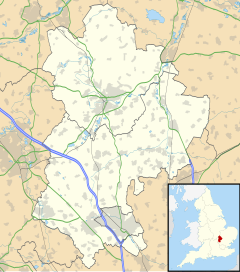Dunstable, England
| Dunstable | |
|---|---|
 Clock Tower and Market Cross |
|
| Dunstable shown within Bedfordshire | |
| Population | 35,000 36,253 (2011 Census) |
| OS grid reference | TL0121 |
| Unitary authority | |
| Ceremonial county | |
| Region | |
| Country | England |
| Sovereign state | United Kingdom |
| Post town | DUNSTABLE |
| Postcode district | LU5, LU6 |
| Dialling code | 01582 |
| Police | Bedfordshire |
| Fire | Bedfordshire and Luton |
| Ambulance | East of England |
| EU Parliament | East of England |
| UK Parliament | |

The route of the Dunstable Northern Bypass proposal and route options for the connecting Luton Northern Bypass.
|
|
| Location | Central Bedfordshire |
|---|---|
| Proposer | Highways Agency |
| Status | Approved |
| Type | Road |
| Cost estimate | £171 million to £217 million |
| Start date | 2014–2015 |
| Completion date | 2016–2017 |
| Geometry | KML |
Dunstable /ˈdʌnstəbəl/ is a market town and civil parish located in Bedfordshire, England. It lies on the eastward tail spurs of the Chiltern Hills, 30 miles (50 kilometres) north of London. These geographical features form several steep chalk escarpments most noticeable when approaching Dunstable from the north. Dunstable is the largest settlement in Central Bedfordshire and third largest in Bedfordshire behind Luton and Bedford.
In Roman times its name was Durocobrivis. There was a general assumption that the nominative form of the name had been Durocobrivae, so that is what appears on the map of 1944 illustrated below. But current thinking is that the form Durocobrivis, which occurs in the Antonine Itinerary, is a fossilised locative that was used all the time and Ordnance Survey now uses this form.
There are several theories concerning its modern name:
Relics of Palæolithic humans, including such relics as flint implements and the bones of contemporary wild animals, suggest settlement is prehistoric. At Maidenbower in the parish of Houghton Regis to the north, there is an Iron Age hill fort, which is clearly marked on the Ordnance survey maps. Maidenbower has some of the ramparts showing through the edge of an old chalk quarry at Sewell where there are Bronze Age remains of an older fort. There are a lot of prehistoric sites in this area and details can be found with the Manshead Archaeological Society who are based in Winfield Street, Dunstable. Dunstable is on the route of the Icknield Way which claims to be 'the oldest road in Britain’.
...
Wikipedia

